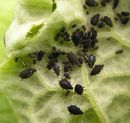Journal of Applied Ecology (2013) 50, 262-270
From Pestinfo-Wiki
 | Selected publication you are invited to contribute to the discussion section (above tab) |
Effects of predator specialization, host plant and climate on biological control of aphids by natural enemies: a meta-analysis
Journal of Applied Ecology 50 (1), 262-270
Abstract: - Aphids are among the most severe invertebrate pests of crops and cause high economic losses. The control of aphids by natural enemies is an essential ecosystem service with high relevance to management strategies applied in agricultural plant production and horticulture. However, the current knowledge on the effectiveness of specialist and generalist predators in aphid control with respect to host plants and climatic conditions has not yet been summarized in a meta-analytical approach.
- We collected 60 studies providing 168 independent cases of predator exclusion experiments to analyse how predator and host plant group and climatic conditions affect aphid control by natural enemies.
- Effects of natural enemies on aphid populations were strongest in assemblages that included specialist predators, either alone or with generalist predators. Generalists alone also reduced aphid numbers significantly, but not to the same extent as specialists.
- Effects of natural enemies were weaker on aphid populations feeding on legumes compared with aphids on grasses or herbs. The percentage reduction of aphids feeding on grasses, herbs or legumes was higher in treatments with assemblages or specialists alone compared with generalists with the largest difference on grasses.
- According to all field studies from the temperate zone, effects of natural enemies on aphid populations were strongest in areas with high precipitation seasonality. A relationship between predator effects and temperature seasonality was only found for the USA.
- Synthesis and applications. Specialist predators alone or assemblages of specialists and generalists had the strongest effect on aphid populations, especially when either feeding on grasses and herbs or when exposed to extreme weather events. The control of aphids by natural enemies is most promising in grass and herb crops, whereas it is less suited for controlling aphids in legume crops. Facing climate change, the effect of extreme weather events on aphid control by natural enemies will have further implications for developing management strategies for aphid control in the future.
(The abstract is excluded from the Creative Commons licence and has been copied with permission by the publisher.)
Link to article at publishers website
Database assignments for author(s): Klaus Birkhofer
Research topic(s) for pests/diseases/weeds:
biocontrol - natural enemies
Research topic(s) for beneficials or antagonists:
environment/habitat manipulation
general biology - morphology - evolution
Pest and/or beneficial records:
| Beneficial | Pest/Disease/Weed | Crop/Product | Country | Quarant. |
|---|